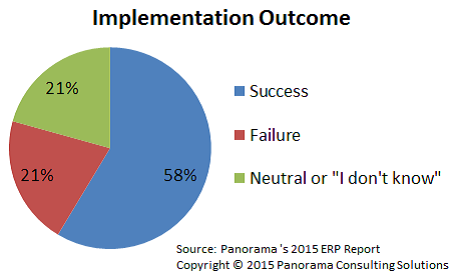The 3 things you must ask any potential SAP Business One partner

If you’re planning to deploy a new ERP system and you’ve opted for SAP Business One then congratulations, you’ve made a good decision. But don’t pat yourself on the back just yet. The next stage of the process is implementation – and the stakes are high.
An ERP implementation project requires a significant investment of business resources. Time, money and a great deal of effort will be spent by everyone involved before you reach the go-live. And, without being too blunt about it – the implementation has to work.
Any kind of implementation failure – a project that comes in late, goes over budget or fails to deliver the intended benefits – is a potential disaster for your business. Unfortunately, many companies that undertake ERP deployment are still getting it wrong. In this year’s edition of Panorama Consulting’s ERP Report (one of the most trusted annual state-of-the-industry reports), just 58% of respondents described their recent ERP project as successful.
That’s a huge 42% who either viewed their implementation outcome as a failure or gave a neutral/’don’t know’ answer. (We could argue that any uncertainty about whether or not an ERP achieved its stated objectives is evidence enough that the project was not entirely successful.)

*The 562 research participants implemented ERP from a variety of vendors and software packages. SAP was the most frequently selected vendor at 39%.
So the Panorama report does not make comfortable reading for companies about to embark on an ERP implementation. And looming in the background is Gartner’s frequently cited finding that 55% to 75% of all ERP projects fail to meet their objectives.
However, your ERP project is not doomed to failure before it’s even begun. Failure may be common, but it is completely avoidable. The key decisions you make at the very beginning of the process will influence the outcome, and one of these is selecting the right partner to work with.
In fact, this decision is just as important as the selection of the software itself. A major ERP vendor like SAP has an extensive partner ecosystem, but a lot of partners won’t be the right fit for your organisation.
Here are three questions you can use to select the right SAP Business One partner:
What is their track record?
Of course, accreditations and technical competence should be the bare minimum of requirements among the partners you consider. Every potential partner will know their way around SAP B1, but how have they put that knowledge to use? What results have they delivered for clients?
Look for credible case studies and customer testimonials, and don’t be afraid to ask for a reference if you need further proof.
Do they have industry/vertical experience?
Relevant industry experience is frequently overlooked by companies selecting an ERP partner, for SAP B1 and other applications. A partner with knowledge of your sector and other businesses like yours should be familiar with key processes and the challenges you face, which means your implementation can really hit the ground running. Again, you should find evidence of this in your prospective partner’s case studies and testimonials.
At APH, we provide IT solutions and support to a number of businesses in the engineering services sector. Our knowledge of the industry means we understand common challenges like efficiently managing a distributed mobile workforce, adapting to changing customer needs and profitably delivering projects that are unique each time.
This industry knowledge, together with our experience of delivering industry-specific solutions for SAP B1 such as Enprise’s job costing solution, makes engineering services companies confident to move forward with us as their implementation partner.
Can they support your change management work?
One thing we always tell people interested in SAP B1 is that implementing a new business system is not just a technical project. It’s also a business change project, which brings its own set of challenges.
Remember that changing your business system – or introducing one in place of disparate systems and manual processes – will have a major impact on the way your employees go about their jobs. Everyone in the organisation will have to adjust and there is bound to be some initial resistance.
Change management is therefore massively important and you need a partner who can genuinely support your efforts, not look for the quickest and easiest way to get their consulting fees and then check out.
An important aspect of managing change will be ensuring users receive the appropriate SAP Business One training, so seek out a partner that can clearly demonstrate the benefits of the system. Although they’re unlikely to train each of your end users individually, you need a partner that can offer technical wisdom in an accessible manner when it’s required.
At APH, we run a technical support desk manned by qualified consultants who always aim to solve an issue on the first call. We never just assign a ticket number and leave the query waiting for a consultant who is only in the office one day a week.
{{cta(’15d75a0f-4734-40bc-9a7f-9b02c93f0951′)}}

